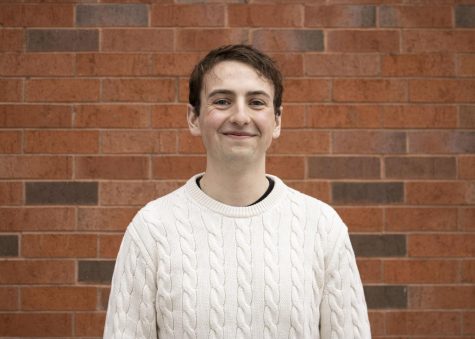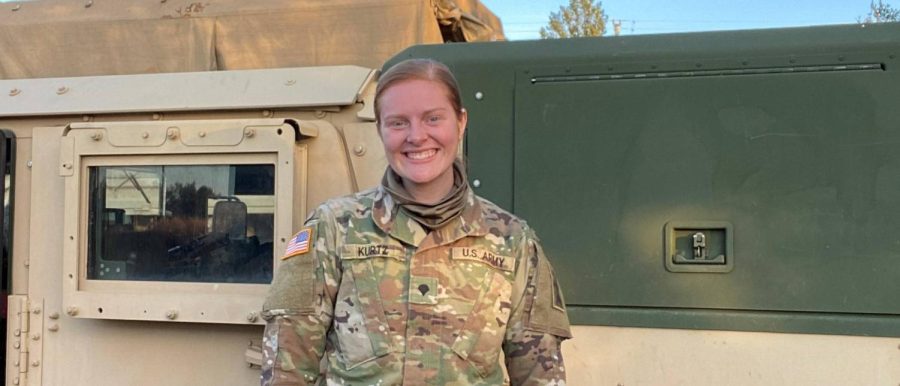Blugold works for mental health advocacy in military
Paige Kurtz, a fourth-year student and member of the National Guard, advocates for mental health on campus and off.
Photo by SUBMITTED
Kurtz said college campuses are excellent places for openness and vulnerability, and that needs to be translated to the rest of society.
Beyond balancing life as a student and member of the National Guard, Blugold Paige Kurtz works with the issues of mental health on campus and in the military.
Kurtz, a fourth-year social work and psychology student, has been enlisted in the National Guard since 2016. Balancing those two areas of life are difficult, Kurtz said. You learn how to do it out of necessity. In her role in the military, Kurtz works in communication.
“I do radio communication, setting up antennas, making sure people can communicate properly across training areas or battlefields or other spaces,” she said. “That’s extremely different than what I’m going into civilian side.”
Kurtz said she found her passion for mental health advocacy both as a social work student and from the military. She joined UW-Eau Claire’s Suicide Prevention and Awareness Research Collaborative in 2020, and said she quickly found ways to do meaningful work.
Christy Prust, a health educator with Student Health Services and SPARC advisor, said a large part of SPARC is the LifeSavers program, which allows trained student members to give presentations on suicide prevention and awareness across campus.
“Paige is dedicated to bringing this information to the military community,” Prust said. “She reached out between SPARC and the ROTC group on campus to see if we could connect and give presentations there, which we did.”
Kurtz said that making the connection between ROTC and SPARC was incredibly important. Mental health advocacy has to start by reducing stigma around those topics, she said, especially in the military.
“Those are our future officers,” she said. “It all stems from leadership. If you can start this advocacy at the stem, and really hit home there, that’s how you create change.”
It’s tough to have a military career without experiencing suicide somehow, Kurtz said. Over the past year, the National Guard in Wisconsin has been activated often, which Kurtz said is difficult.
Kurtz said she was sent to southern Wisconsin for COVID-19 response, helping to set up testing centers, and her unit was also activated for events like protests, the election and other COVID-19 or vaccination responses — at a much higher rate than usual.
“People will see things that are traumatizing, or that they’re just unable to process,” she said. “You go out and see all this stuff, and then come home and are expected to forget about all of it. Return to ‘normal’ life.”
The military is an especially difficult place to battle mental health stigma, she said. Because the army is treated as very masculine, members don’t want to open up about their weaknesses, no matter how normal those are.
But, there is some progress. Kurtz said her commander opened up to her unit, and that his ability to be vulnerable helped the rest of them too.
“We are in the process of creating a new army,” Kurtz said. “An army more focused on mental health. We have to transition away from stigmatizing our very real mental health problems. That starts with leadership.”
Dr. Jennifer Muehlenkamp, founder and director of SPARC, praised Kurtz’s passion and intersectional work.
“She is an exceptional advocate on campus for mental well-being and passionate about spreading positive, proactive messages about preventing suicide,” Muehlenkamp said. “There is hope and Paige shares that hope with all she comes in contact with.
Kurtz said she hopes to build a career in mental health advocacy, and continues to work for it today, both on campus and in the military.
“There’s work to be done, but it can only get better from here,” Kurtz said. “It’s all about spreading the word that it’s okay to not be okay, but it’s not okay to think you’re alone.”
Resources for mental health can be found at: https://www.uwec.edu/counseling-services/.
DeLapp can be reached at [email protected]

Thomas DeLapp is a fourth-year English and journalism student, and this is his fifth semester on staff. He loves oxford commas and loathes AP style for taking them away from him.

